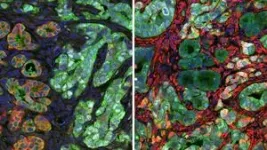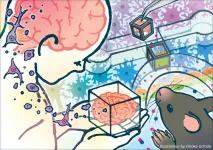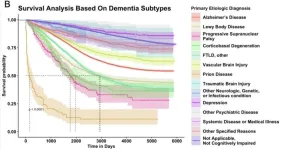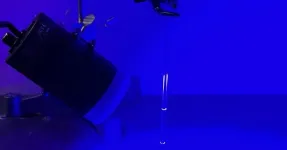(Press-News.org) Washington D.C., Feb. 28, 2024- The Global Alzheimer’s Platform Foundation®, (GAP) is releasing the first results from the Bio-Hermes-001 Study. This study in over 1000 community-based participants from throughout the US compared the results of blood and digital biomarkers with brain amyloid PET scans or cerebrospinal fluid assays. The study revealed a strong correlation between several blood tests, particularly p-tau 217, with the presence of amyloid plaques in the brain, a diagnostic hallmark of Alzheimer’s disease (AD). This relationship was demonstrated across the entire study population including the 24% percent of Bio-Hermes participants from African American, Latino and other traditionally underrepresented communities, an unprecedented level of diversity. These findings will enhance the field’s ability to provide a more economical, timely, and accurate diagnosis of Alzheimer’s disease and speed enrollment into clinical trials.
“We expect the Bio-Hermes data will make a substantial contribution to how the field characterizes and diagnoses the pathologies underpinning Alzheimer's and related dementias. We designed this study to simplify and accelerate this complicated and time-consuming diagnostic process. GAP is proud that we succeeded in ensuring that the participants in this study reflected the diverse underrepresented populations afflicted with dementia. And, with the assistance of our partners, we have assembled one of the largest collections of the leading digital and fluid biomarkers that are poised to accelerate more rigorous and accurate diagnosis of this heinous disease for everyone." said GAP President, John Dwyer. “I would like to thank our partners and my fellow co-authors who made this a reality; we expect this paper to be the first of many that will use the Bio-Hermes data to shed light on the clinical opportunities and challenges emerging for all people with Alzheimer's and related dementias.”
Currently, diagnosis of Alzheimer’s disease requires expensive scans or invasive spinal taps that are not accessible to all. With the recent approval of disease-modifying Alzheimer’s treatments, there is a growing need to simplify and accelerate an accurate diagnosis. In an effort to address the need to improve the diagnostic process, GAP convened a unique collaboration of leading biopharma, digital technology, nonprofit partners, and seventeen clinical research sites from the GAP network (GAP-Net) around the United States to conduct Bio-Hermes.
Dr. Richard Mohs observed that “This paper moves the field ahead in simplifying the diagnosis of Alzheimer’s disease. The results show that blood tests are very good for identifying persons with amyloid plaques in brain. The blood tests worked for people with or without symptoms of disease and for persons of all racial and ethnic backgrounds. The field still struggles to enroll members of underrepresented minorities in clinical trials, but these results show that with sufficient outreach and recruitment efforts, blood tests can be used to identify appropriate study participants.”
To ensure that the data was representative of all impacted by Alzheimer’s, the study prioritized the inclusion of traditionally underrepresented populations as African Americans are twice as likely and Hispanic populations 1.5 times as likely to develop Alzheimer’s and related dementias compared to older White Americans, and research has not yet identified the cause. The researchers drew blood-based biomarker data from more than 1,000 people who were cognitively normal, living with Mild Cognitive Impairment or living with mild Alzheimer’s disease in the community. Of these volunteers, nearly 25% were of diverse backgrounds.
Coauthors of the study include Richard C. Mohs, Douglas Beauregard, John Dwyer, Jennifer Gaudioso, Jason Bork, Tamiko MaGee-Rodgers, Mickeal N. Key, Diana R. Kerwin, Lynn Hughes, Cyndy B. Cordell, and The Bio-Hermes Collaborative Group.
The Bio-Hermes study collaboration including the following partners: AbbVie, AITIA, Alzheimer's Drug Discovery Foundation, Aural Analytics, Biogen, C2N Diagnostics, Cognivue, Emtherapro, Gates Ventures, Eli Lilly, IXICO, Linus Health, Merck, Pentara, Quanterix, RetiSpec, Roche Diagnostics, Somalogic, and the University of Gothenburg.
To read the paper in Alzheimer's & Dementia: The Journal of the Alzheimer's Association, visit https://doi.org/10.1002/alz.13722.
About the Bio-Hermes study:
In 18 months, GAP and its network of clinical research sites throughout the U.S. (GAP-Net) enrolled more than 1,000 volunteers in Bio-Hermes, the first-ever comparison study of blood-based biomarkers and digital Alzheimer’s test technologies. Bio-Hermes compared the performance of dozens of blood tests, digital cognitive tests, retinal exams, and speech analysis with traditional methods of measuring cognition and PET images. The Bio-Hermes data set is expected to inform future clinical practice and clinical trial designs just in time to assist with the surge expected due to the recently approved disease modifying therapies for treating Alzheimer’s disease.
About the Global Alzheimer’s Platform (GAP) Foundation:
The nonprofit Global Alzheimer’s Platform Foundation was founded to speed the delivery of Alzheimer’s treatments with a commitment to promoting diversity in clinical research, as well as lowering the cost and duration of clinical trials to ensure that no one is left behind. As part of its mission, GAP supports more than 100 clinical research sites worldwide through study start-up and recruitment activities, promoting diversity in research studies, and giving attention to the citizen scientists who make research possible.
END
Promising pathways to simplified Alzheimer's diagnosis unveiled in groundbreaking study
The results of the Bio-Hermes study appear in Alzheimer's & Dementia showing how new Alzheimer’s detecting blood tests perform across a broad range of races and ethnicities for the first time
2024-02-28
ELSE PRESS RELEASES FROM THIS DATE:
Understanding genetic risk could save sight and predict multiple sclerosis earlier in young people
2024-02-28
Young people could be spared from going blind by a new genetic risk tool that could also help diagnose multiple sclerosis (MS) earlier, to start effective treatments.
Optic neuritis is a condition that affects people of all ages, but especially young adults, usually manifesting in blurred vision and sometimes pain when moving the eyes. Up to half of people affected in the UK eventually go on to develop MS – often many years later. Emerging evidence indicates that starting the very effective MS treatments earlier may improve long term health.
Optic neuritis occurs because of swelling in or around the optic nerve. For those with MS-related optic neuritis, the swelling subsides ...
Cannabis use linked to increase in heart attack and stroke risk
2024-02-28
Research Highlights:
An analysis of survey data for 430,000 adults in the U.S. found that using cannabis has a significant association with an increased risk of heart attack and stroke, independent of tobacco use, with higher odds among the adults with more frequent use (more days of use per month). The most common method of cannabis use was smoking, followed by eating or vaporizing it.
The increase in the combined risk of coronary heart disease, heart attack and stroke was similar to the risk among the subset of adults who had never used e-cigarettes but did use cannabis.
Embargoed until 4 a.m. CT/5 a.m. ET Wednesday, February ...
Researchers model blood-brain barrier using “Tissue-in-a-CUBE" system
2024-02-28
A research team at the RIKEN Center for Biosystems Dynamics Research (BDR) in Japan has succeeded in establishing a model of the blood-brain barrier using modularized tissue derived from human cells. The “Tissue-in-a-CUBE” is a small cubic structure that could provide a boost in the drug discovery field and be used as an alternative to animal models in pre-clinical studies. The study was published in Communications Biology on February 28.
The blood-brain barrier is a strict gatekeeper around the brain that prevents foreign substances in blood from entering the brain. Although protective, the barrier poses challenges when treatments ...
Study identifies blood biomarkers to predict risk of cardiovascular disease in patients with rheumatoid arthritis
2024-02-28
KEY TAKEAWAYS
Rheumatoid arthritis is associated with increased risk of cardiovascular disease, but it can be challenging to predict which individuals are at highest risk.
Mass General Brigham experts in rheumatology and cardiovascular disease worked together to identify six biomarkers found in blood samples that can predict future risk of arterial inflammation among patients with rheumatoid arthritis.
The team is now working to test these biomarkers in a larger and more long-term cohort of patients with rheumatoid ...
Ai finds key signs that predict patient survival across dementia types
2024-02-28
New York, NY [February 28, 2024]—Researchers at the Icahn School of Medicine at Mount Sinai and others have harnessed the power of machine learning to identify key predictors of mortality in dementia patients.
The study, published in the February 28 online issue of Communications Medicine [10.1038/s43856-024-00437-7], addresses critical challenges in dementia care by pinpointing patients at high risk of near-term death and uncovers the factors that drive this risk. Unlike previous studies that focused on diagnosing dementia, this research delves into predicting patient prognosis, shedding light on mortality ...
Light stimulates a new twist for synthetic chemistry
2024-02-28
Molecules that are induced by light to rotate bulky groups around central bonds could be developed into photo-activated bioactive systems, molecular switches, and more.
Researchers at Hokkaido University, led by Assistant Professor Akira Katsuyama and Professor Satoshi Ichikawa at the Faculty of Pharmaceutical Sciences, have extended the toolkit of synthetic chemistry by making a new category of molecules that can be induced to undergo an internal rotation on interaction with light. Similar processes are believed to be important in some natural biological systems. Synthetic versions might ...
More than just neurons: A new model for studying human brain inflammation
2024-02-28
LA JOLLA (February 28, 2024)—The brain is typically depicted as a complex web of neurons sending and receiving messages. But neurons only make up half of the human brain. The other half—roughly 85 billion cells—are non-neuronal cells called glia. The most common type of glial cells are astrocytes, which are important for supporting neuronal health and activity. Despite this, most existing laboratory models of the human brain fail to include astrocytes at sufficient levels or at all, which limits the models’ utility for studying ...
Urgent need to develop best practices to advance use of AI in cardiovascular care
2024-02-28
Statement Highlights:
The American Heart Association encourages research and development of artificial intelligence (AI) and other related tools and services that may support and enable more precise approaches to cardiovascular and stroke research, prevention and care.
Academia, industry and governments worldwide are pouring resources into developing AI-based tools to transform how and when health care is delivered.
While promising research is beginning to emerge in many areas of cardiovascular medicine, AI-based tools, algorithms and systems of care have not yet been proven to improve care enough to justify widespread use.
AI and machine learning digital tools currently exist that ...
Smoking cannabis associated with increased risk of heart attack, stroke
2024-02-28
Smoking cannabis associated with increased risk of heart attack, stroke
NIH-funded observational study shows risk grows sharply with more frequent use
Frequent cannabis smoking may significantly increase a person’s risk for heart attack and stroke, according to an observational study supported by the National Institutes of Health. The study, published in the Journal of the American Heart Association, uses data from nearly 435,000 American adults, and is among the largest ever to explore the relationship ...
NYUAD researchers highlight a potential flaw in operating room ventilation that increases risk of infection by COVID-19
2024-02-28
● Simple modifications to ventilation systems improve airflow, making operations safer for both patients and surgical teams
● This research was conducted in close collaboration with a team of surgeons from Cleveland Clinic Abu Dhabi (CCAD)
Abu Dhabi, UAE, February 28, 2024: NYU Abu Dhabi (NYUAD) engineers studying ventilation systems in surgical operating theaters have found that traditional ventilation systems may inadvertently facilitate the circulation of aerosolized pathogen-carrying particles. This, as a result, puts surgical teams at a higher risk of infection by COVID-19 and other airborne diseases.
Using basic engineering tools, including ...
LAST 30 PRESS RELEASES:
Test platforms for charging wireless cars now fit on a bench
$3 million NIH grant funds national study of Medicare Advantage’s benefit expansion into social supports
Amplified Sciences achieves CAP accreditation for cutting-edge diagnostic lab
Fred Hutch announces 12 recipients of the annual Harold M. Weintraub Graduate Student Award
Native forest litter helps rebuild soil life in post-mining landscapes
Mountain soils in arid regions may emit more greenhouse gas as climate shifts, new study finds
Pairing biochar with other soil amendments could unlock stronger gains in soil health
Why do we get a skip in our step when we’re happy? Thank dopamine
UC Irvine scientists uncover cellular mechanism behind muscle repair
Platform to map living brain noninvasively takes next big step
Stress-testing the Cascadia Subduction Zone reveals variability that could impact how earthquakes spread
We may be underestimating the true carbon cost of northern wildfires
Blood test predicts which bladder cancer patients may safely skip surgery
Kennesaw State's Vijay Anand honored as National Academy of Inventors Senior Member
Recovery from whaling reveals the role of age in Humpback reproduction
Can the canny tick help prevent disease like MS and cancer?
Newcomer children show lower rates of emergency department use for non‑urgent conditions, study finds
Cognitive and neuropsychiatric function in former American football players
From trash to climate tech: rubber gloves find new life as carbon capturers materials
A step towards needed treatments for hantaviruses in new molecular map
Boys are more motivated, while girls are more compassionate?
Study identifies opposing roles for IL6 and IL6R in long-term mortality
AI accurately spots medical disorder from privacy-conscious hand images
Transient Pauli blocking for broadband ultrafast optical switching
Political polarization can spur CO2 emissions, stymie climate action
Researchers develop new strategy for improving inverted perovskite solar cells
Yes! The role of YAP and CTGF as potential therapeutic targets for preventing severe liver disease
Pancreatic cancer may begin hiding from the immune system earlier than we thought
Robotic wing inspired by nature delivers leap in underwater stability
A clinical reveals that aniridia causes a progressive loss of corneal sensitivity
[Press-News.org] Promising pathways to simplified Alzheimer's diagnosis unveiled in groundbreaking studyThe results of the Bio-Hermes study appear in Alzheimer's & Dementia showing how new Alzheimer’s detecting blood tests perform across a broad range of races and ethnicities for the first time






